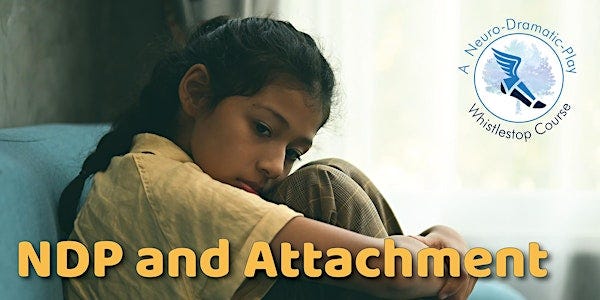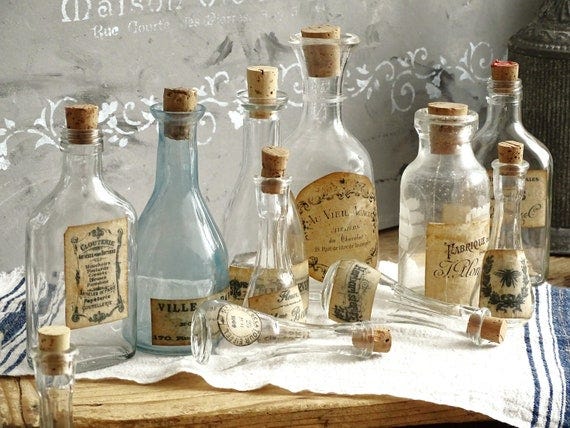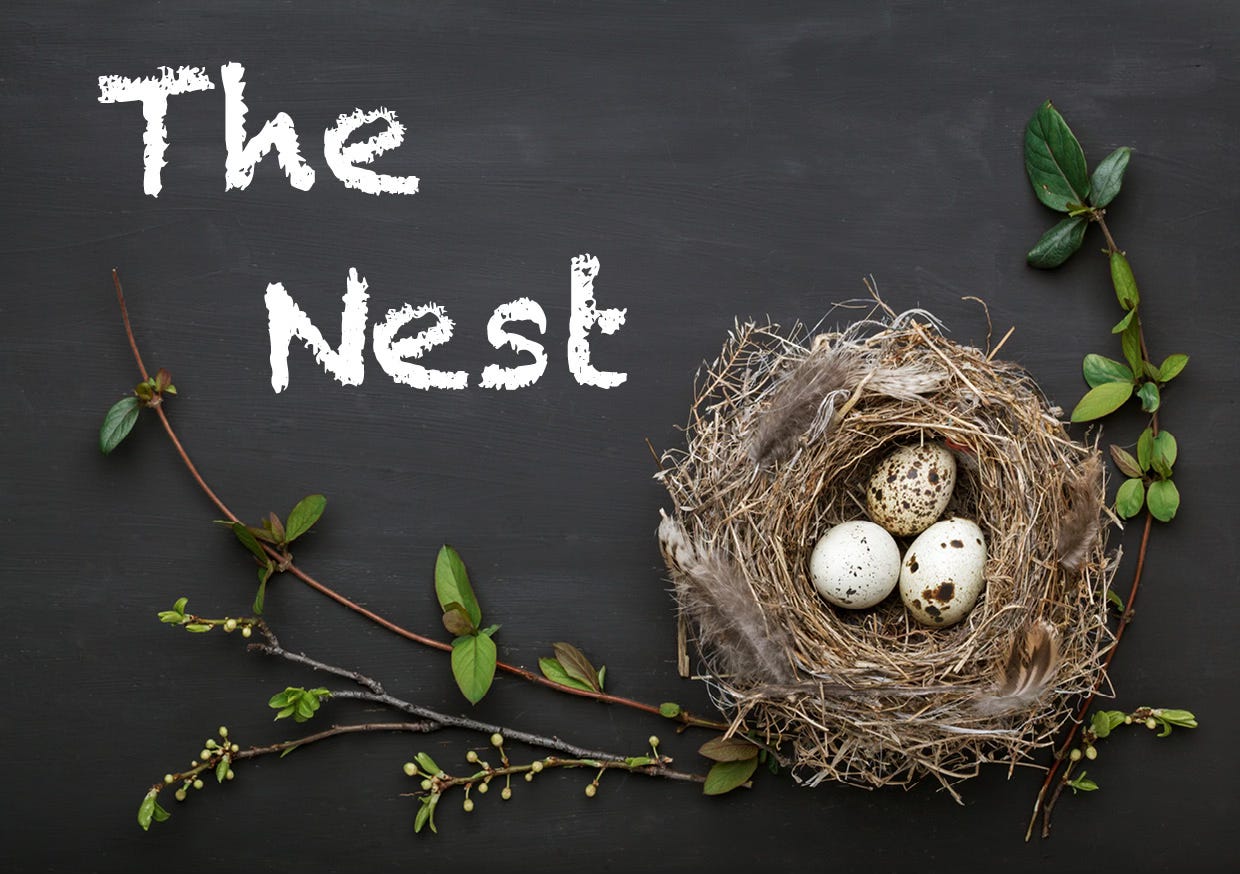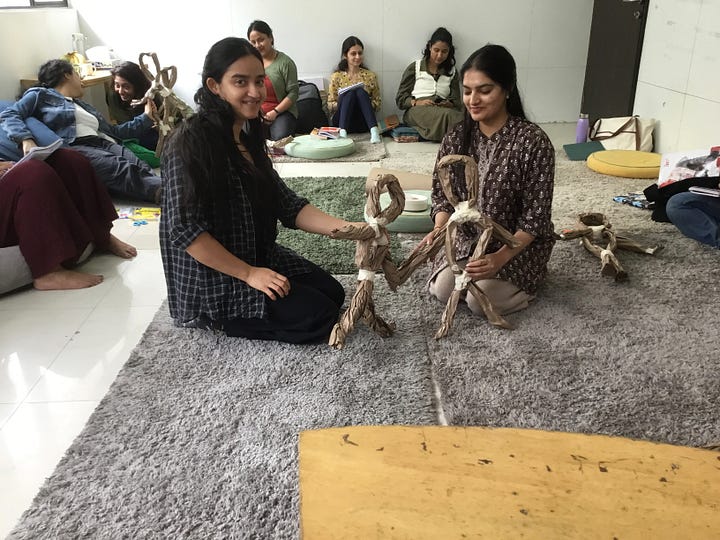

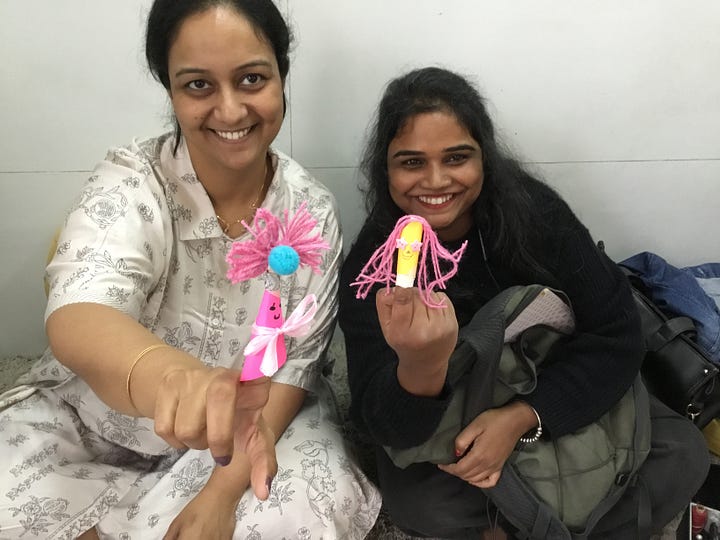
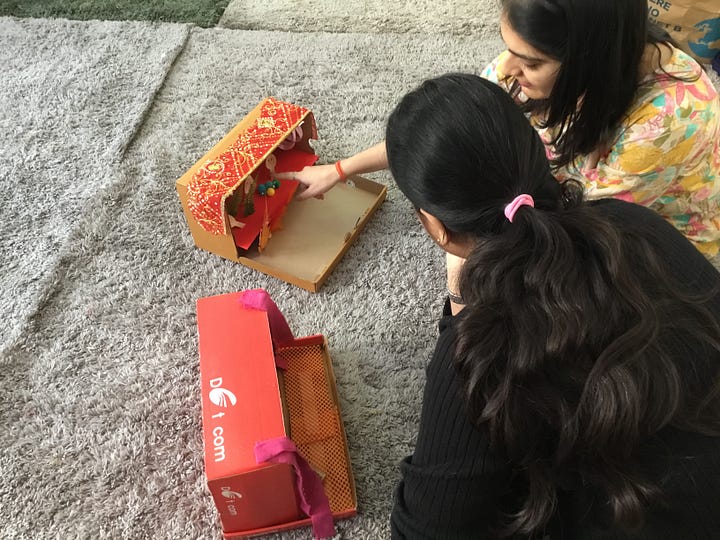
Dear Members and Followers,
Hello from India! I am near Delhi and teaching the NDP group at Children First. Today was the Puppet Module and in the pictures above you can see the very creative puppets they have been making. This is the first time on the course that we are not using A Midsummer Night’s Dream as the core text. Instead the students are choosing a character from the Mahabharata and developing one of the stories around the character. They have already created a puppet of their character, and are creating a mask as they begin rehearsals of their stories. As with A Midsummer Night’s Dream they will create their ‘theatre-in-a-box’ with a scene from their story. Then, next week they will present their final performance. It is a challenge for me as well, because although I ‘know’ the Indian epic, I know Shakespeare’s works in greater detail, and A Midsummer Night’s Dream most of all!

It is a complete joy to meet up with my dear friend, Aanand Chabukswar – we first met 25 years ago, when he came to UK to study Dramatherapy with me. He has developed his own approach in India, called ‘Arts Based Therapy’ as well as practising in psychiatry, and teaching theatre students. He is also teaching Therapeutic Storytelling to the NDP students, together with the latest neuroscientific research on the impact of storytelling on the brain. We shall be going to a theatre performance of puppetry, before he returns home to the south of India where it is already too hot to be comfortable! Here in Delhi it is just warm enough! What a difference from the storms, snow and floods in the UK!
And the great news is, Aanand has agreed to join our Board of Advisors of NDP, where he will help to monitor our syllabus, in particular the therapeutic storytelling.
It is only fitting that I should include one of the therapeutic stories he uses in this edition of the Newsletter.
Tell it to the Walls
A folktale collected by A.K. Ramanujan about a wise old woman
This woman had cared for her family for many years. She lived in a multi-generational home with her husband, four sons and daughters-in-law. Sadly, even though she worked hard and did much for them, she was often mistreated. Like many other older women, she was ignored, criticized, and belittled. Wanting to keep peace in the family, she tried her best to stay silent and ignore their rude and disrespectful behavior. She began to comfort herself with food and soon became very fat. This just gave her family another reason to taunt her, and so fatter and fatter she grew.
One day, after her daughter-in-law gave the old woman a tongue lashing, she decided to take a walk. She soon found herself at an old, abandoned house. Its roof had blown away. The old woman made her way to the center of the house and began sharing her sorrows with a wall. As many storytellers know, the wall can be a good listener. The old woman also found this to be true. And so, she began sharing, tentatively at first, the years of torment from her first-born son. And suddenly, her words burst forth – filled with both anger and tears. Like a torrent that would never stop, her words continued. After a while, the wall could no longer contain all the suffering and collapsed before her eyes. She moved to the next wall and continued to share each horrible memory of her second son – the name calling and the belittling. Soon, this wall collapsed. This continued as she shared the suffering from her third and fourth sons. Wall after wall collapsed in the wake of her words. The house was now in ruins. The old woman simply walked away. She was now thin and free from the hurt inside.
This story can be applied with individuals as well as in group work, and can be explored in many different ways. It can be enacted, moved and painted. People may also explore the idea of being the walls that eventually tumble down. Indeed, you may decide that the theme of walls could be explored further, thinking of the character of ‘Wall’ in A Midsummer Night’s Dream. One of the workpeople plays the wall through which Pyramus and Thisbe send loving messages. Another association could be the lines from Richard Lovelace’s poem, To Althea, from Prison, ‘Stone walls do not a prison make, Nor iron bars a cage.’
My eventful life!
There are still memories tumbling back from my childhood in North Devon; maybe 4 / 5 years old is a time when memories come back clearly, and are often ‘felt’. Off the main landing of this big house was a corridor that led to another pair of bedrooms, one shared by my two older brothers, and the other was my older sister’s room. On the small landing between the bedrooms was a wash-hand basin, and one day my brothers called me and said they had something to show me. They had constructed a creature coming out of the plug hole of the basin, from wire and various bits and pieces that I don’t recall, and they told me it was a monster that had up from the drains. I turned and ran, screaming at the top of my voice. Apparently, I could be heard throughout the house! My mother was very, very cross.
But I got my revenge. I was outdoors, playing in the sandpit at the side of the house. And I heard my mother tell one of the boys to fetch me for lunch, and I quickly crept into an opening in our hedge so that I could not be seen. When he returned to tell mother I wasn’t there, I quickly crawled back into the sandpit again and carried on playing, innocently! My mother could see me through the window and called me indoors, meanwhile telling my brother off. He was completely mystified at my re-appearance! I was an adult before I told him what really happened.
Until next time.
Thank you so much for being a part of my network – it feels as if I have lots of friends who are willing to hear about new ideas and contribute their own.
With Love,
Dr Sue
Forthcoming Courses
We have some more of our new popular ‘Whistlestop’ Webinars coming up this spring – just the right thing if you are looking for extra CPD or only have time for brief encounters, wherever you are!
NDP and Self-Harm
Wednesday 19 March, 1800-2000 (UK time)
Friday 21 March, 0900-1100 (UK Time)
Next week’s Whistlestop Course explores the potential basis for much of self-harming behaviours, and suggests creative methods to both understand and even change this destruction of the body. We shall consider how we can take pressure off children and young people to provide answers, when often they do not know themselves why they hurt themselves. There will also be opportunities for questions from people’s work or home examples.
NDP and Attachment
Monday 28 April, 1200-1400 (UK time)
Wednesday 30 April, 1800-2000 (UK Time)
April’s Whistlestop webinar provides a contemporary view of ‘attachment theory and practice’ and looks at changes since John Bowlby’s original pioneering work. There is now much more variation in cross cultural understanding of attachment, and there is also the impact of mothers returning to work. We shall also look at attachment in relation to ‘looked after’ children and the struggles of new attachments in fostering and adoption.
We shall explore creative and practical exercises that can be applied in education, therapy and parenting in order to address attachment difficulties. Therapeutic stories are important in attachment work and examples will be given.
Please do request new webinars from me if there is a special topic you would find useful). All these courses can be booked through Eventbrite.
Remember that you can study for the NDP Diploma as a Self-Guided course, in your own time and at your own pace. There are optional ‘live’ tutorials. The elements are the same as the live training and so are the assessments.
Just a little nudge – please consider becoming a paid subscriber. Not only does it help me as a writer, you also gain more, with additional article, stories and techniques, 4 free webinars each year, and 10% discount on any UK training. As a paid subscriber you are supporting new things that I am creating and are closely involved in the process. Just £65 per year or monthly instalments. Thanks and a hug. Deluxe membership is £120 per year and gives free monthly consultations, 6 free webinars per year and 15% off UK training.
Miss Penny-Weather’s Country School
And finally, our bed-time story. This time it is the next section from our story about life at a rural school after WW2.
The Story of Jimmy Swift, the Boy from Somerset:
Miss Penny-Weather’s Country School story is based on events that the author experienced or that she heard about as a child in post-war Britain. It creates the atmosphere of the rural school and is a useful addition to lessons about social history. It will eventually be published as a book, but meanwhile look out for the recording on YouTube.
Episode 11
Jimmy arrived back at the barge which was moored beyond the locks. Someone had been cleaning the brass fittings as they were shining in the afternoon sunshine. Some good smells were coming from the kitchen - his mother must be preparing the supper - and it would be something special as they had done several days of better paid work.
‘How was school?’ asked his dad, and Jimmy explained that the school was closed because of the burst water pipe, and the flooding. He told him about going off to the barn with Mathew and how his friend had helped him with reading and adding up.
‘You mean the other lad was able to teach you, like the teacher?’ said his dad, incredulously.
‘Yes dad, all the other children went to school when they were five. And Mathew could read before he even went to school,’ said Jimmy.
‘And I suppose he can really help his dad with his work,’ said his dad.
‘Well, no,’ explained Jimmy, ‘His dad is a doctor so everything is to do with medicines. All he gets to do is wash out bottles for pills, like his mum and big sister, very boring.’
Jimmy was going to say some more, when suddenly Mathew appeared at the side of the barge, very breathless, he had obviously been running very fast in order to catch up with them.
‘I’ve got a message for you from school,’ said Mathew as he tried to catch his breath. Jimmy’s dad slowed the boat down, so Mathew could stop running!
‘Miss Penny-Weather has sent another note to parents, telling them the school is still closed tomorrow because of the flooding, and the next day the school nurse is coming.’
‘And who is the school nurse?’ said mum as she came up on deck from the kitchen, with Jimmy’s little sister by her side, ‘Is someone ill?’
‘Oh no,’ laughed Mathew, ‘She comes every term and checks how people are, whether they have put on weight, if they have rashes, and she looks in their hair.’
He tailed off, a bit embarrassed, he didn’t like to say about possible nits. Mathew leant over to Jimmy and said quietly, ‘We have a name for her – it’s Nitty Norah.’
Jimmy and Mathew started giggling.
Jimmy’s mother said, ‘Well I’m sure our hair is clean,’ and she returned down the steps again, looking a bit huffy.
Mathew said, ‘Thank you, Mr Swift, I must be going or my parents will worry.’ He turned to Jimmy and winked, ‘See you Thursday, my friend.’
And he turned and started to run back the way he had come.
Jimmy’s dad turned to him and said, ‘And what is this with, Mr Swift? Where did that come from? It the name of the barge, not the family! Our family name is Ferryman, and a solid bargees name it is.’
Jimmy felt awkward, and tried to explain. ‘It was the first day I went to the school and they asked me my last name and I didn’t want to get anyone into trouble, so I said the name of the boat…’.
‘Alright,’ said dad, ‘I get it, and it was right you tried to protect the family. Let’s say no more about it.’
They travelled on in silence for a while, enjoying the tranquillity of the rural surroundings. Then his dad said, ‘It’s time we had a talk, we have to make some changes. The law now says that you have to go to school, your little sister the same – so we won’t get to say anything.’
‘But I can’t go to school every day, you need me here,’ said Jimmy, becoming a bit troubled.’
‘Wait until we moor up for the night and then we can have a proper talk, nothing to fret about,’ said his dad. ‘Come on, it’s supper time.’
So Jimmy had to wait to hear about the new plans, cos he couldn’t figure it out, he would love to go to school every day but he knew he was needed on the boat! He somehow felt there were going to be some surprises. There was one thing he was very glad about, and that was the inclusion of his little sister.
But now it was food time, and he had to practice his reading – and his sums!
(If you prefer to listen to these stories, they will shortly be available on YouTube ‘NDP Storytime with Sue Jennings’ and ‘Stories of Mouse and Mouse’. The ‘Moose and Mouse’ stories are available in the paid section below and are written for children under the age of 6 years. They address important issues in child development such as attachment, loss, playfulness, adventure, safety and fears. See our website here.)
Welcome to our Subscribers’ exclusive area with more news items, resources, stories and more. If you can’t see what’s below then please do subscribe and join us!
Dear All –
Welcome to your special Newsletter – if you are a recent joiner, remember you can read back issues of the Newsletter – especially if you wish to follow the stories from the beginning: ‘Moose and Mouse and the Ducklings,’ and ‘Jimmy Swift, the Boy from Somerset.’
Keep reading with a 7-day free trial
Subscribe to Sue Jennings Presents to keep reading this post and get 7 days of free access to the full post archives.






